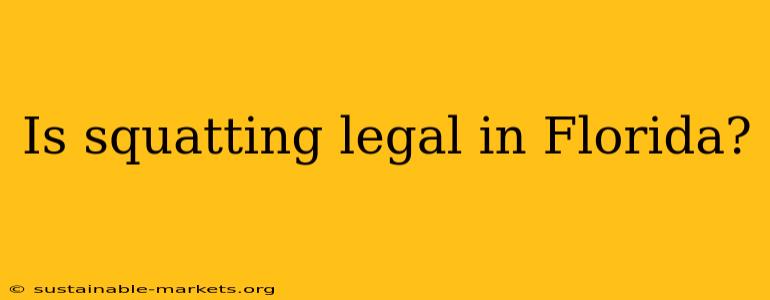Squatting, the act of occupying a property without the owner's permission, is generally illegal in Florida, just as it is in most states. However, the legal landscape surrounding this issue is more nuanced than a simple yes or no answer. Understanding Florida's laws on adverse possession is crucial to clarifying the legality of squatting in specific circumstances.
What is Adverse Possession?
Adverse possession is a legal doctrine that allows a person who has openly, notoriously, and continuously occupied a property for a specific period (in Florida, it's typically seven years) to claim legal ownership, even without the consent of the actual owner. It's a complex legal process with strict requirements, and it's not a license to squat. Simply occupying a property doesn't automatically grant ownership through adverse possession.
Key Requirements for Adverse Possession in Florida:
To successfully claim ownership through adverse possession in Florida, the squatter must demonstrate all of the following:
- Actual Possession: The individual must physically occupy the property. This means more than just occasionally visiting; it necessitates continuous, open, and notorious use.
- Exclusive Possession: The possession must be exclusive to the squatter, meaning they're not sharing the property with others who have a superior claim.
- Open and Notorious Possession: The occupation must be visible and obvious to the true owner. Hiding the occupation undermines the claim.
- Continuous Possession: The possession must be uninterrupted for the required statutory period (generally seven years in Florida). There are exceptions, such as temporary absences.
- Hostile Possession: The possession must be without the owner's permission. This is a key element, differentiating adverse possession from a tenancy agreement.
- Payment of Taxes: In some cases, the adverse possessor may need to show proof of paying property taxes on the land for the statutory period.
The Difference Between Squatting and Adverse Possession:
It's critical to differentiate between simple squatting and a claim of adverse possession. Squatting is illegal. Adverse possession is a legal process that, if successfully proven in court, can lead to ownership. The key difference lies in the intent and the fulfillment of all the requirements mentioned above. Simply occupying a property without the owner's permission does not automatically qualify for adverse possession.
Penalties for Illegal Squatting in Florida:
Illegal squatting in Florida can result in various legal repercussions, including:
- Eviction: The property owner can legally evict the squatter through the court system.
- Criminal Charges: Depending on the circumstances, criminal charges like trespassing or burglary might be filed.
- Civil Lawsuits: The property owner can sue the squatter for damages, including unpaid rent (if applicable), property damage, and legal fees.
Seeking Legal Advice:
The laws surrounding adverse possession are intricate and highly fact-specific. If you're facing a situation involving property occupation in Florida, it's crucial to seek advice from a qualified Florida real estate attorney. They can assess your specific situation and provide guidance based on applicable laws and court precedents. This article is for informational purposes only and does not constitute legal advice.
Disclaimer: This information is for educational purposes only and should not be considered legal advice. Consult with a qualified legal professional for guidance on specific legal situations.

